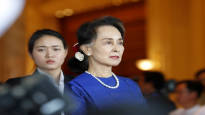Myanmar’s 78-year-old civilian leader has spent the last year alone in a prison cell. Numerous international appeals have been made for his release.
Myanmar’s civilian leader Aung San Suu Kyi about being transferred from prison to a government building in the capital city of Naypyidaw, a member of Suu Kyi’s NLD party told news agency AFP.
– Aung San Suu Kyi was moved to a high-level complex on Monday night, the source, who remained anonymous, said.
78-year-old Suu Kyi has been imprisoned since the military coup in February 2021. He has been sentenced to no less than 33 years in prison in closed trials. The basis of the judgments has been, among other things, corruption.
The imprisoned civilian leader has denied all charges, and according to the UN and human rights organizations, the sentences are unfounded.
For two years, only little information has been received about Suu Kyi’s health. He has spent a year in a private cell. He has reportedly only been seen in public once.
A member of the NLD party also told AFP that Suu Kyi has met with the speaker of the country’s lower house of parliament, and that she would also likely meet with China’s Asia envoy who is visiting Myanmar.
The army has not confirmed information about the transfer
Myanmar’s military junta has not confirmed the transfer of the former human rights activist from prison. The public broadcasting company BBC estimatesthat the transfer might be a sign that the junta would have listened to pleas to release Suu Kyi.
There have been concerns about Suu Kyi’s health. The BBC’s Burman news agency reported last week that it had received information from Naypyidaw prison that he was in good condition.
Myanmar is formerly called Burma. The name was changed to Myanmar in 1989 by the military administration.
A long house arrest behind before the democratic reforms
Aung San Suu Kyi is the daughter of Burmese national hero Aung San. In the late 1980s, he took on the role of the front man of the country’s democracy movement and was put under house arrest for 15 years. He received the Nobel Peace Prize in 1991.
After being released from house arrest in 2010, he became the country’s civilian leader, but did not become the elected president. Among other things, abroad, he was also accused of an overly condescending policy towards the army.
The following year, the Myanmar military took full power in the country again after ten years of a more democratic era. Suu Kyi was imprisoned. Currently, in many places in Myanmar, there is a situation similar to a civil war between the army and its opponents. Thousands of people have died in the violence.
